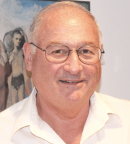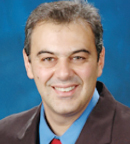Presentation of the PERTAIN study data by lead author Grazia Arpino, MD, PhD, was met with high interest at the 2016 San Antonio Breast Cancer Symposium.

Steven Vogl, MD
Steven Vogl, MD, of the Bronx, New York, commented, “This is a very complicated study for me, but it seems that at least half your patients got chemotherapy first along with trastuzumab (Herceptin), with or without pertuzumab (Perjeta), so the question is more about maintenance after stopping chemotherapy. In this group, adding pertuzumab is good. The other patients were just getting primary hormonal therapy. You need to convince me this group needs the anastrozole.”
Dr. Arpino responded that “another trial would be necessary” to explore that question. “This trial only tests whether, if you give hormonal therapy, it’s more effective to add pertuzumab,” she emphasized.

The early separation of the progression-free survival curves, and the fact that they stayed separate, is an important signal for such a small study.— Homayoon Sanati, MD, MS
Tweet this quote
“I want to clarify that PERTAIN was not designed to decide which patients should get hormonal therapy or chemotherapy,” she said, explaining, “to make enrollment easier, we gave physicians the choice of also giving chemotherapy, which was the trend at the time. Surprisingly, almost half the patients did not get the chemotherapy.”
She continued, “PERTAIN is just showing that if you decide for your patient that you want to start hormonal therapy and anti-HER2 therapy, you’d better start using the two drugs together. They are more effective than trastuzumab alone.”
Homayoon Sanati, MD, MS, of Long Beach Memorial Medical Center in California, told The ASCO Post that he was impressed by the findings and could foresee using this triplet in his practice. “We saw that all subgroups benefited from pertuzumab, and the duration of response was good. The early separation of the progression-free survival curves, and the fact that they stayed separate, is an important signal for such a small study,” he said. ■
Disclosure: Dr. Vogl reported no potential conflicts no interest. Dr. Sanati’s institution has received research funding support from Roche/Genentech.


